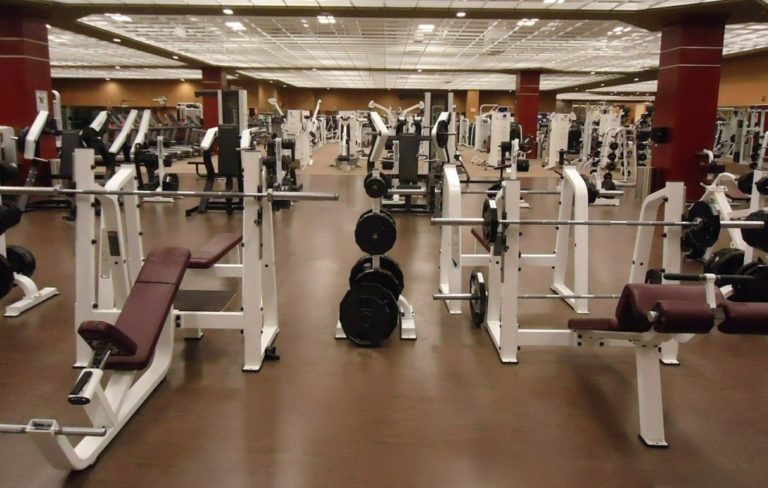
The state Supreme Court wrangled Wednesday with whether creating a “separate-but-equal” section for female gym-goers discriminates against trans women or men.
 100vw, 1024px” data-recalc-dims=”1″><figcaption>(Image by <a href=) David Mark from Pixabay via Courthouse News)
David Mark from Pixabay via Courthouse News)HARTFORD, Conn. (CN) — Twisted up in a modern-day Gordian knot, several justices on the Connecticut Supreme Court worried Wednesday that they could open the door for lawsuits involving lesbians, fat men or cordoned-off pools if they OK women-only sections at gyms.
In the underlying case, two gyms run by Edge Fitness set aside special workout areas only for women, catering primarily to devout Muslim and Jewish women who are forbidden by their religious beliefs to exercise with men. Nobody complained to the gyms’ management, according to the gyms’ attorneys.
After the separate sections were created, however, two male gym members filed discrimination complaints with the state Commission on Human Rights and Opportunities. A hearing officer initially concluded the separate workout areas did not violate the state law, likening the areas to single-sex bathrooms and locker rooms.
Testifying for the gyms, one psychologist said that women often feel sexually objectified when exercising alongside men, and a survey found most women who used the separate workout areas did so to avoid judgment. Most women also indicated they would cancel their gym memberships if the separate workout areas were eliminated.
Before the case could go to trial, a state judge found that the workout areas aligned with gender-privacy and religious-freedom interests.
Several religious and transgender-rights organizations filed amicus briefs in the case. Glad Legal Advocates & Defenders, as well as the Connecticut TransAdvocacy Coalition and other gay rights groups, wrote in their brief that the trial court created a new and ill-defined implied right to gender privacy, adding that there were huge differences between a public workout area and a locker room.
“A new ‘gender privacy’ right that is untethered from statutory text and based on the discomfort of others also risks undermining this state’s explicit legislative mandate of equality and inclusion for transgender people,” the brief states.
In their own brief, Jewish, Catholic and Muslim religious organizations noted the importance of modesty for their female members, emphasizing that such tenets “preclude[] them from wearing exercise clothing and assuming the often provocative poses that exercise requires in the presence of men.”
During a hybrid hearing, where some of the attorneys attended virtually, the Connecticut high court fell into a rabbit hole of hypothetical scenarios, including whether lesbians should be excluded from the women-only area if the heterosexual women felt ogled, or if a heavy man felt fat-shamed in the common area should a certain area be set aside for him.
In posing such hypotheticals, Judge Christine Keller noted that “women can feel objectified almost anywhere,” including bars or even on the street. “Why do women need to run and hide?” she asked.

James Shea, an attorney with Jackson Lewis representing the gyms, said current anti-discrimination laws would protect other groups and that there is more of an assumption of privacy in a gym.
Keller later noted that women can be objectified at swimming pools, too. “Should we have separate hours for women at swimming pools, public swimming pools, separate swimming pools for women, screened off from men?”
“No, your honor,” Shea answered. “I don’t think that pools or beaches are traditionally male-dominated environments.”
Other justices were sympathetic to the religious women’s desire for privacy. Justice Maria Araujo Kahn wondered what options religious women would have for gyms if the court barred the single-sex workout areas. “What is left for them? Where do they go then?” she asked.
Human Rights Commission attorney Michael Roberts said that would depend on the individual, but he added that “discrimination on the basis of a protected class is not deemed to be a reasonable accommodation for a religious belief.”
Some justices speculated, however, that not setting aside a special section for women could also pose a problem.
“So what’s the solution?” asked Justice Steven Ecker. Would a woman “who feels she is being ogled by some sweaty guy 6 feet away, she needs to make a complaint about that and earn an enemy in the gym and go through that sort of nonsense?”
Roberts noted there are a number of nondiscriminatory solutions to that problem, including employee training and penalizing clear instances of harassment.
Ecker later hinted that he thought there may be no triable issue at all. “Is there a serious argument that this harms men?” he asked, noting that men have dominated gyms for decades. “I get the principle, it’s very clear, but it’s hard for me to see any practical discrimination going on here.”